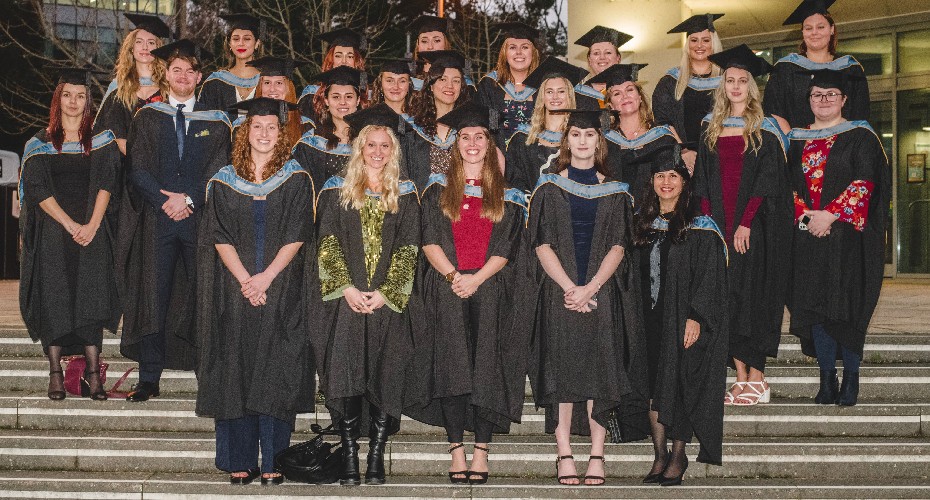First students graduate from Exeter’s pioneering nursing degree programme

The first students from Exeter’s pioneering four-year MSci Nursing programme have graduated this weekend, before starting their new careers as healthcare leaders of the future.
The 25 new graduates were the first to embark on the University of Exeter’s innovative MSci Nursing degree, which launched in 2019. The degree equips students to face the current and future challenges of the NHS. Students on the course are taught the art and science of nursing from day one, with an emphasis on the fundamentals of nursing care.
The unique course allows students to choose to achieve a dual registration in adult and mental health nursing equipping students to work in roles at the interface of physical and mental health, or single registration in adult nursing preparing them for clinical academic careers. The Academy of Nursing provides the next generation of nurses with the skills and experience to become the nursing leaders of the future, able to deal with complex situations like global pandemics.
The course was developed in collaboration with patients, members of the public, and nurses from Devon Partnership, Royal Devon and Exeter University Healthcare, and the Torbay and South Devon NHS Trusts.
Mental and physical health are fully integrated throughout the programme with ‘no health without mental health’ forming one of the core pillars of the programme.
Professor Richard Kyle, Interim Head of the Academy of Nursing and Professor of Interprofessional Education, said: “The pandemic showed us just how essential nurses are to our health and social care system. Our pioneering group of students were particularly affected by Covid, continuing their studies throughout the lockdowns which took place just months after their course started. We are immensely proud of how tenacious and courageous they have been and are incredibly excited to see what they go on to achieve next. We know they will soar in their careers and are already making a difference to the lives of the people and populations they now serve as our first ever Exeter Nurses”
Carolyn Mills, Chief Nursing Officer at Royal Devon University Healthcare NHS Foundation Trust, and Honorary Senior Lecturer in the Academy of Nursing, said: “Nurses are valued highly by society for their frontline care and core values, but they also have to have technical skill, management acumen and expert knowledge. Nursing has always moved with the times and the Academy of Nursing has equipped these new graduates to embark on their careers at the cutting edge of care, with the knowledge, skills, and confidence to lead the way.”
Chris Burford, Chief Nursing Officer & Allied Professions Lead at the Devon Partnership NHS Trust, and Honorary Senior Lecturer in the Academy of Nursing, said: “All of the evidence tells us that our physical and mental health and wellbeing are inextricably linked – we have to look after both of them if we are to stay fit and well. By equipping nurse leaders of the future with this dual qualification, we are taking a huge, pioneering step forward.”
Yasmin Cannell, who graduated on Saturday, said: “I’m really looking forward to starting as a newly qualified nurse and I’m excited to put my learning into practice. It feels amazing to be the first cohort that’s gone through Exeter as nurses, and it’s been a rollercoaster ride!
“The highlights have been clinical skills and being in placement in a hospital and learning from consultants, nurses, and doctors. I think Exeter is a great university and there are so many opportunities in the Medical School alone. They’re a really supportive team at the nursing academy.”
The pioneering programme is built around the unique ‘seven pillars of nursing’. They are:
- the fundamentals of nursing care
- ethics and professionalism
- evidence for practice
- patient and public involvement
- no health without mental health
- global health
- leadership and management
These pillars are woven throughout the curriculum and have recently been shared through publication of a textbook co-written by the Academy of Nursing’s academics, students and patient and public involvement group members.



